Can After-The-Event Insurance Premiums and Success Fees be recovered?
Currently awaiting the outcome of an appeal to Foskett J are a trio of cases involving claimants who moved from Legal Aid to CFAs just before the rules changed on 1 April 2013 – Surrey v Barnet HNS Trust, AH v Lewisham NHS Trust and Ramos v Oxford University NHS Trust.
Before section 44 Legal Aid, Sentencing and Punishment of Offenders Act 2013 (LASPO) was implemented on that date, winning litigants who funded their claims by CFAs were permitted to recover ATE Insurance Premiums and Success Fees from losing opponents. Thereafter, with limited exceptions, they have ceased to be recoverable and are payable by the winning party out of any damages recovered. This meant that in March 2013 the situation facing anyone not using a CFA who wanted to recover these additional liabilities, rather than having to meet them out of damages, was “it’s now or never”. That included parties funding their cases using that rare and threatened species called Legal Aid.
The issue was broadly the same in the appeal; clients in three personal injury claims had been advised by their solicitors that, due to LASPO, if they wished to move to a CFA from Legal Aid they would have to act by 31 March 2013 at the latest. However, there was a common denominator as the clients were not advised that if they made the change, the additional 10% general damages which was now recoverable under Simmons v Castle [2012] 5 Costs LR 1150 para 50, was not payable if they had a CFA .
That gave rise to a simple question: if that advice was imperfect, faulty or merely incomplete, was it just to visit upon the paying NHS Trusts, the ATE Premiums and Success Fees that the winning claimants sought in costs when neither would have been payable had they remained on Legal Aid? In the cases under appeal, they were large sums; in Ramos alone about £261,000 and in AH the extra 10% damages amounted to £18,000.
At first instance, the Costs Judges had held that the advice was not good enough to enable the clients to make informed decisions. The absence of anything being said about Simmons was a critical omission and did not permit a reasonable choice to be made. It followed that the ATE Premiums and Success Fees were unreasonable items of costs to incur under CPR 44.4 and they could not be recovered from the NHS Trusts.
“That cannot be right,” the claimants argued on the appeal. Their cases had been won fair and square, and as the NHS Trusts had been ordered to pay their costs, the quality of advice given confidentially in a solicitor/client relationship should not enable them to escape their liability. Indeed, where the client might have no quarrel with the advice and/or that it would not have affected his choice, why should the solicitor, it was said, be dispossessed of the Success Fee he earned for the risk of running the case for nothing if the claim failed, or the ATE insurer for writing the insurance policy to meet the NHS Trust’s costs if the case be lost?
Significant sums turn upon the outcome of the three appeals but they are merely in the vanguard. Scores of others are waiting in line behind with significant amounts at stake for lawyers, ATE insurers and NHS Trusts alike. It can be asked rhetorically, and perhaps a little mischievously, whether the architects of CFA funding and the proponents of its dismantling could ever have predicted how fertile and lucrative a land for lawyers it was within the CFA regime that had been created? And we are not at the end yet, not by a long way. The Court of Appeal has still to be involved. That is years away.
Colin Campbell – Consultant to Kain Knight



